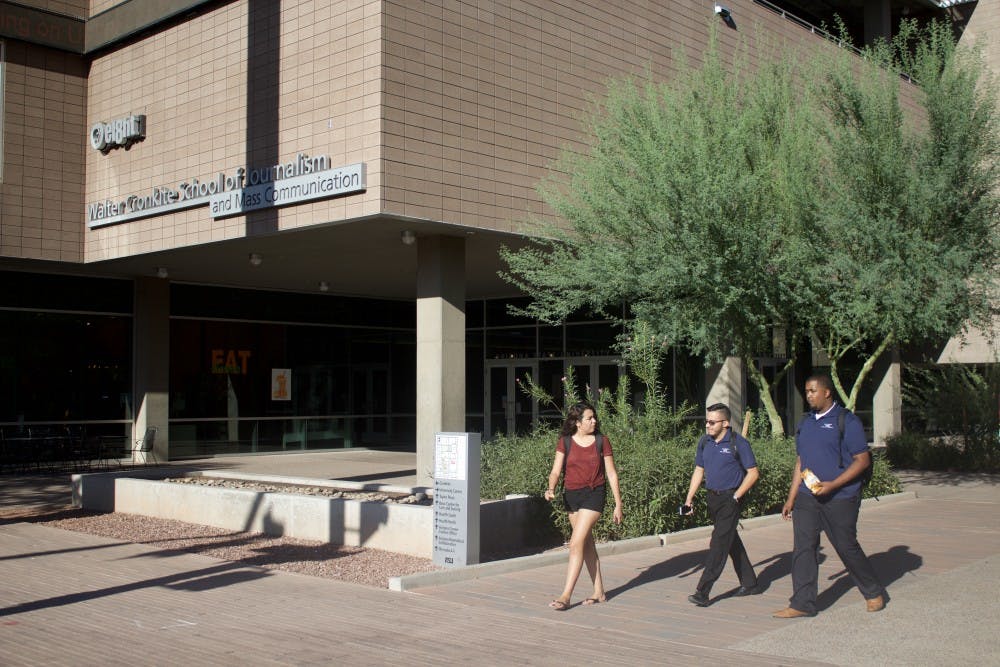Over 1,000 students are currently enrolled at the Walter Cronkite School of Journalism and Mass Communication. It is within the halls of that building, in the heart of downtown Phoenix, that students hone their craft in a variety of disciplines to become the public relations specialists, truth seekers and multimedia story tellers of tomorrow.
However, those who entered the school before late 2016 will find themselves graduating into a very different media landscape.
As President Donald Trump rose to the nation's highest office, so did the term "fake news."
It is a label that only consists of two words. It is an accusation that is loosely slung, but not always deserved. It is a problem that Cronkite graduates in the field will need to be aware of and deal with.
The popularity of "fake news" as a Google search item spiked with the induction of our 45th President, and while it is currently on a downswing, it remains higher than it has been for more than five years.
Both on news sites with comment sections and their social media posts, you will often find at least one instance of the phrase posted to disparage the content of a news piece. Cronkite alumni should not be surprised to find the same accusation slung at them.
"I don't like the term at all," Dan Gillmor, professor of practice at Cronkite, said. "People who lie all the time have taken over the expression to use against actual journalism."
Cronkite students must be careful. A microscope has been placed on the media, and by extension ASU journalism students have been too. Even the slightest impression of ill will or unfairness will be quickly blown up by those eager to bring supposed journalistic wrongdoing to light.
It is crucial that students practice proper procedure when creating their stories. They must diligently follow the Society of Professional Journalism (SPJ) code of ethics at all times.
That is not to say there isn't a fair bit of actual baloney floating around the web. Convenience and easy access to information has also made the spread of falsehoods much more efficient and virulent.
If you have ever used Facebook, you may have come across an image macro about bananas being infected with HIV or a teacher putting on a sex ed "demonstration" for a sixth-grade class.
These sensational tales are more easily spread than the efforts to debunk them. Bogus stories make a mockery of the profession and tarnish its reputation. It is up to the journalists of tomorrow to protect the integrity of their craft.
"I think journalists ought to be the primary defenders of reality," Gillmor said. "I think part of the job is to ... debunk things that are false, but to do it in a way that's not going to spread misinformation any further."
The best way to combat the fake news frenzy is to be a model of how news is done right. Journalists must be thorough, ethical, even-handed and professional not just in the eyes of the masses, but with their personal conduct.
Cronkite students, too, must help maintain the good name of journalism through good bearing and high-quality work.
Of course, that is not to suggest that journalists should not ask the hard questions or challenge any accusations of spreading lies. However, this must be done with a cool head and without belligerence.
Falsehoods, no matter how often they are repeated, cannot stand up to substantive fact forever.
But do make sure it is backed up with evidence, of course.
Reach the reporter at jlbrook8@asu.edu and follow @jlbrook8 on Twitter.
Like The State Press on Facebook and follow @statepress on Twitter.
Editor’s note: The opinions presented in this column are the author’s and do not imply any endorsement from The State Press or its editors.
Want to join the conversation? Send an email to opiniondesk.statepress@gmail.com. Keep letters under 500 words and be sure to include your university affiliation. Anonymity will not be granted.




